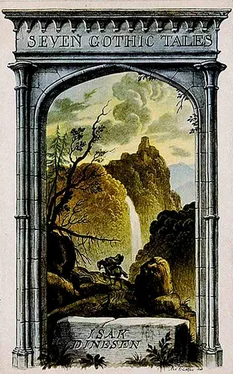Isak Dinesen - Seven Gothic Tales
Здесь есть возможность читать онлайн «Isak Dinesen - Seven Gothic Tales» — ознакомительный отрывок электронной книги совершенно бесплатно, а после прочтения отрывка купить полную версию. В некоторых случаях можно слушать аудио, скачать через торрент в формате fb2 и присутствует краткое содержание. Жанр: unrecognised, на английском языке. Описание произведения, (предисловие) а так же отзывы посетителей доступны на портале библиотеки ЛибКат.
- Название:Seven Gothic Tales
- Автор:
- Жанр:
- Год:неизвестен
- ISBN:нет данных
- Рейтинг книги:5 / 5. Голосов: 1
-
Избранное:Добавить в избранное
- Отзывы:
-
Ваша оценка:
- 100
- 1
- 2
- 3
- 4
- 5
Seven Gothic Tales: краткое содержание, описание и аннотация
Предлагаем к чтению аннотацию, описание, краткое содержание или предисловие (зависит от того, что написал сам автор книги «Seven Gothic Tales»). Если вы не нашли необходимую информацию о книге — напишите в комментариях, мы постараемся отыскать её.
The stories in this collection are:
Deluge at Norderney
The Old Chevalier
The Monkey
The Roads round Pisa
The Supper at Elsinore
The Dreamers
The Poet
Seven Gothic Tales — читать онлайн ознакомительный отрывок
Ниже представлен текст книги, разбитый по страницам. Система сохранения места последней прочитанной страницы, позволяет с удобством читать онлайн бесплатно книгу «Seven Gothic Tales», без необходимости каждый раз заново искать на чём Вы остановились. Поставьте закладку, и сможете в любой момент перейти на страницу, на которой закончили чтение.
Интервал:
Закладка:
“ ‘It is on this account,’ Rasmus said, ‘that the fine people of Copenhagen have all been spoiling you, Jonathan. They have been watching you all the time to see if the soul of Baron Gersdorff was showing itself in you, in which case you would be the richest man, and the best match, Jonathan, in all northern Europe.’ Then he proceeded to recount to me a conversation that he had had with Baron Gersdorff about me:
“ ‘You know me, my good Rasmus, to be a poet,” the Baron had said to him. ‘Well, I will tell you what sort of poet I am. I have never in my life written a line without imagining myself in the place of some poet or other that I know of. I have written poems in the manner of Horace or Lamartine. Likewise I am not capable of writing a love letter to a woman without representing to myself in my own mind either Lovelace, the Corsaire or Eugene Onegine. The ladies have been flattered, adored, and seduced by all the heroes of Chateaubriand and Lord Byron in turn. There is nothing that I have ever done unconsciously, without knowing well what I did. But this boy, this Jonathan, I have really made without thinking of it. He is bound to be, not any figure out of Firdousi, or even Oehlenschlaeger, but a true and genuine work of Joachim Gersdorff. That is a curious thing, a very curious thing, for Joachim Gersdorff to be watching. That is a phenomenon of extreme importance to Joachim Gersdorff. Let him but show me what a Joachim Gersdorff is in reality, and no reward of mine shall be too great. Riches, houses, jewels, women, wines, and the honors of the land shall be his for it.’
“All this I heard as I was lying in my bed.
“I do not know if you will think it strange, My Lord, or you, Miss Nat-og-Dag, that the strongest emotion which these words aroused in me was a feeling of deep shame. Such a strong feeling I had never, in all my life, experienced.
“If the Baron had seduced me, as I believe that he did seduce other pretty boys, I should have had to blush before the faces of honest people. But I might have found refuge from that shame in my own heart, for in a way I loved the man. For the shame which I now felt it seemed to me that there was no refuge anywhere. Upon the very bottom of my soul, I felt, and that for the first time in my life, the eyes of all the world.
“God made the world, My Lord, and looked at it, and saw that it was good. Yes. But what if the world had looked back at him, to see whether he was good or not? This was, I thought, what Lucifer had really done to God: he had looked at him, and had made the Lord feel that he himself was being judged by a critic. Was he good? I—I had been innocent as God. Now I was made a true Joachim Gersdorff. I had in all my veins the blood of this man, of a man of fashion, the sort of man who attracts the eyes of all the world. God could not stand it. He hurled down Lucifer, as you remember, into the abyss. God was right; he should not have stood it. I could not stand it either, but I had to.
“To find out whether Rasmus was right I did, I think, a brave, even a heroic, thing, which proves to my mind that I had been well brought up, after all, by the skipper and his wife. I went to a big party at the house of Countess Danneskjold, and sang to them again. I sang my old songs, and I heard my own voice, or what was left of it. You will understand, who are listening to me now, how poor that must have been. I had sung to them before, and done my best, and it seemed to me that I had then given them the very best which I had in me. As I now sang there was not one of the faces around me which showed the slightest disappointment or regret. All the people were kind and complimentary to me, as they had always been. I felt then that I had never given them anything, had never done anything to them at all. It was the world around me which was watching me, and meant to do something to me. All eyes were on me, for I was a genuine Joachim Gersdorff, a young man of fashion. I came away from that house at midnight, and that was the hour, My Lord, of which the fall of the granary reminded me.
“The same night I wrote a letter to the Baron, to take leave of him. I was so filled with abhorrence of him and all his world that, on reading my letter through, I found the word ‘fashion’ recurring nine times. I gave my letter to Rasmus to hand to him. As he was leaving I remembered that I had said nothing of the fortune which the Baron meant to leave to me. I now charged my friend to communicate to him my refusal of any of it.
“I could not stand the sight of the streets. Leaving my pretty rooms in the neighborhood of the Gersdorff Palace, I went in a boat across the harbor to the small fortified island of Trekroner, and took lodgings with the quartermaster, where I could see nothing but the sea. Rasmus walked down with me, and carried my bag. All the time he was trying to hold me back. We had to pass the door of the Gersdorff Palace, and such a sudden loathing of the whole place filled me at the sight of it that I spat at it, as my father—alas, as the skipper Clement Mærsk of Assens—had taught me to spit when I was a boy.
“For a few days I lived at Trekroner, trying to find again there the world as it had once been mine—not myself, for I wanted nothing less than myself. I thought of the garden of Assens, but it was closed to me forever. Once you have eaten of the tree of knowledge, and have seen yourself, gardens close themselves to you. You become a person of fashion, even as did Adam and Eve when they began to occupy themselves with their appearance.
“But only a few days later Rasmus came over to see me. He had taken a small yawl to get to me, he who was so terrified of the sea.
“ ‘Ah, my friend,’ he said, rubbing his hands, ‘you were born under a lucky star. I gave your letter to the Baron, and as he read it he became to the highest degree excited and delighted. He got up and walked to and fro, and exclaimed: “God, this misanthropy, this melancholy! How I know them. They are my own altogether! For the first week after I had become the lover of the Empress Catherine I felt all that he feels now. I meant to enter a monastery. It is young Joachim Gersdorff to a turn, but done all in black, an etching from the colored original. But good God, what power the boy has got in him, what a fine deep black! I had not thought it of him with his high voice. This is the winter night of Russia, the wolves upon the steppes.” After he had read your letter a second time he said: “He will not be a man of fashion? But so we all are, we Gersdorffs; so was my father at the court of the young Empress. Why should not my son be the same? Surely he shall be our heir, the glass of fashion, and the mold of form.”
“ ‘I tell you, Jonathan,’ said Rasmus, ‘that your melancholy is the highest fashion of the day. The elegant young men of Copenhagen wear black and speak with bitterness of the world, and the ladies talk of the grave.’
“And this was the time when they took to calling me Timon of Assens.
“ ‘Did you tell him,’ I asked Rasmus, ‘that I will on no account have any of his money?’ And Rasmus answered, ‘Yes, I did; and he was so pleased that I thought that he might have a stroke and leave you his heir there and then. “Good,” he said, “good, my son Timon. Let me see you throw it away. Scatter it well. Show the world your contempt of it in the true Gersdorff way. Let the hetæra have it; there is no better advertisement for a melancholy man of fashion. They will follow you everywhere and make a charming contrast to your deep black. How I love that boy,” he said. “I have,” he added, “a collection of emeralds, unmatched in all Europe. I will send him that to start with.” And here, indeed, it is,’ said Rasmus, handing me, with great care, a case of jewels.
“ ‘But when the Baron heard,’ Rasmus said, ‘of your spitting at the door of his house, he became very grave. “That,” he said, “I did to my father’s door, to the door of the Gersdorff Palace of St. Petersburg.” He at once sent for his lawyer, and drew up a document to acknowledge you as his son, and to leave you all his fortune. Likewise he has written to obtain for you the title of Knight of Malta, and the name of De Résurrection.’
Читать дальшеИнтервал:
Закладка:
Похожие книги на «Seven Gothic Tales»
Представляем Вашему вниманию похожие книги на «Seven Gothic Tales» списком для выбора. Мы отобрали схожую по названию и смыслу литературу в надежде предоставить читателям больше вариантов отыскать новые, интересные, ещё непрочитанные произведения.
Обсуждение, отзывы о книге «Seven Gothic Tales» и просто собственные мнения читателей. Оставьте ваши комментарии, напишите, что Вы думаете о произведении, его смысле или главных героях. Укажите что конкретно понравилось, а что нет, и почему Вы так считаете.












